Why Genre Isn’t Just About Content

Every year, we’re lucky to have great sponsors for our nonprofit events. AutoCrit, a 2020 NaNoWriMo sponsor, helps you celebrate your commitment to your novel with excellent editing resources. Today, they’re here to share some insight about how the your novel’s genre can shape your word choice as well as your story:
Anybody could be forgiven for believing that genre is defined by content. A fantasy story is fantasy because it deals with magic, myth, and worlds different from our own. Horror is horror because it seeks to scare us with monsters, ghosts, and the dark side of humanity. Romance is romance because it centers on relationships and the “will they, won’t they” romantic narrative.
But content isn’t the only thing that delivers a true genre experience on the written page – as an author, the success of your story is also deeply rooted in the language you use.
Just like cinema has its own visual language that subtly (or not so subtly) clues us in on the kind of movie we’re watching, genre literature also takes advantage of linguistic seeds to create the kind of reading experience fans enjoy.
But how is it done? Let’s dive in and see!
First to the front-line in backing up your content delivery are what we call Power Words. Well known in marketing circles, these words have an automatic impact on the human mind. This could be down to onomatopoeia, the forceful or strange nature of a word’s pronunciation, or simply the natural imagery a word conjures.
Words such as intense, obliterate, breathtaking, and slyly would all fall under the banner of Power Words.
In fiction, power words are a useful way of condensing concepts and feelings into a single word that elicits a strong emotional response. After all, the more concise and clear your writing is, the better it is for your readers. And as the number of these words increases throughout your novel, the emotional landscape of your book begins to take shape – like some long-forgotten island emerging from a blanket of fog – forming the basis of how your reader feels as they move through your story.
At AutoCrit, we regularly research and inspect the emotional foundations of all kinds of novels. See if you can guess what kind of stories these are:
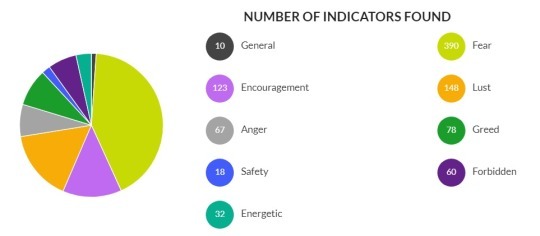
The above is, of course, a horror novel. A heavy blanket of words rooted in fear takes prime position here.
Here’s another:
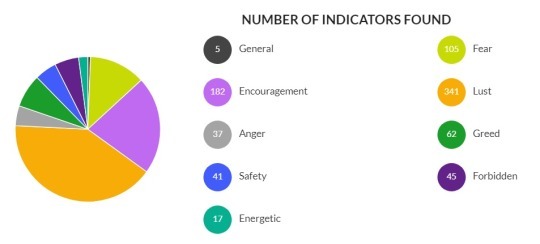
You can probably guess that this particular novel is a romantic drama, with a heavy dose of lust-based language backed up by encouragement (a staple of any involving dramatic arc) and, of course, fear – reflecting the fear of loss, or missing a chance, that so many romantic narratives rely on.
And a final example:
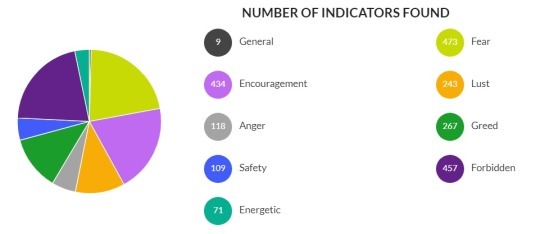
At the forefront here is an almost equal combination of the forbidden, encouragement, and fear – backed up by a large sprinkle of lust and greed.
This is, of course, a mystery thriller – Dan Brown’s The Da Vinci Code, to be exact!
Looking at these charts, it’s almost too easy to place the kind of novel to which you’d expect them to belong, and that’s reflective of the importance of proper power word management. The content could be the same, but a horror novel simply wouldn’t feel like a horror novel if the language were primarily rooted in a safe or encouraging emotional space. Would it?
But hold on just a moment, because we’re about to go deeper…
The truth is that even the most innocuous words are essential building blocks of storytelling, and therefore deserve the same level of scrutiny in your finished work.
The word dragon, for example, is unusual enough that you could instantly know it is more likely to appear throughout a fantasy novel than it would in, say, a modern day spy thriller. The same could be said for the power word kill – much more likely to show up in horror than romance. That’s an easy one.
But what about a word as simple as just?
Usually viewed as a filler word that can easily be deleted during editing, something as simple as just can actually be used to great effect in different genres – that is to say it does have a place.
Take a look at these examples, where we’ve compared our use of the word just in a horror novel to what we would expect, through extensive research, to see in books of other genres.
First up, fantasy:
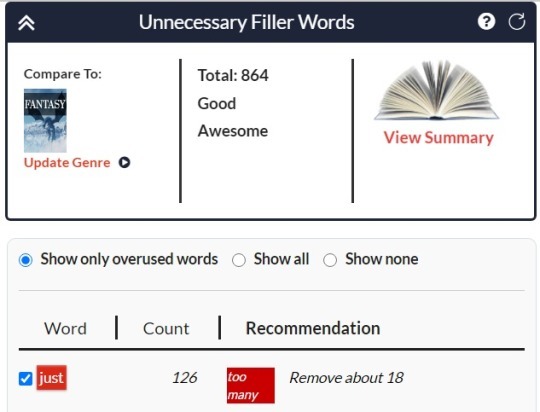
Compared to the content of an average best-selling fantasy novel, AutoCrit recommends we remove 18 instances of our use of the word just.
The fantasy genre is one that relies most on its world-building and the visceral experience of the narrative, so we’re less likely to see simple, common words being used to subtle effect. That’s not to say such a thing doesn’t exist within fantasy, but it is more likely to happen in romance, which we see here:
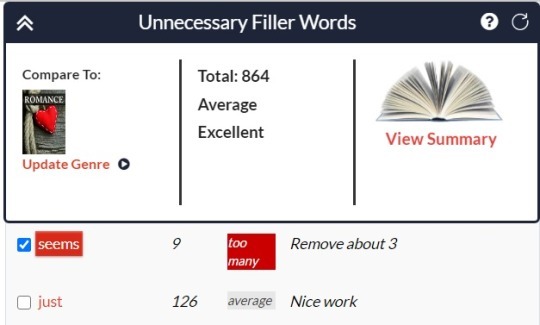
In romance, our use of just appears to be completely within expectations. There is a good reason for this: Romance often deals with human emotion and relationships, sporting increased amounts of dialogue. Naturally, people will use filler as they speak, so words like just are going to be more common here.
But since we’re writing a horror story, what about comparing our manuscript to best-selling horror?
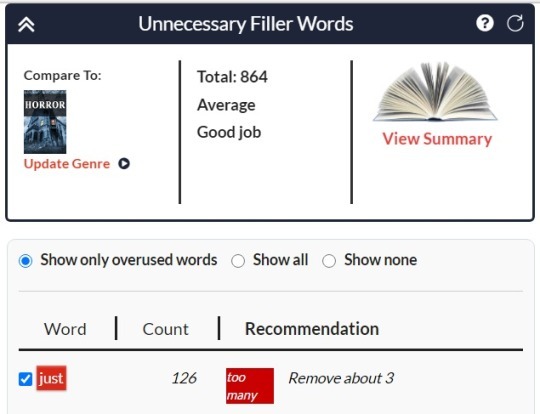
Far fewer than the 18 removals recommended under fantasy, in horror it’s recommended we remove only 3. This is, again, reflective of the difference in base language between the genres – horror can very effectively use the word just to demean characters or increase horrific effect by seemingly playing down the shocking nature of occurrences.
Your story’s content often helps to dictate the language used – but, as you can see, it’s always worth revisiting your use of language while you refine the experience for readers throughout your second draft and beyond. Being aware of the overall context as you edit is a power to be envied by any word wizard.
The right content, delivered with the right words to the right audience. Now there’s a recipe for NaNo success.
Here at AutoCrit, we’re looking forward to helping you achieve just that throughout the remainder of 2020 and beyond. Visit our NaNoWriMo 2020 offer page to enjoy 60% off an annual AutoCrit subscription.
NaNoWriMo winners also enjoy free entry into the January editing of our Book Editing Breakthrough Challenge, where we’ll guide you day by day through the how and why of the most impactful edits you can make in your manuscript.
Happy writing!
Top photo by Shelby Miller on Unsplash
Chris Baty's Blog
- Chris Baty's profile
- 63 followers



